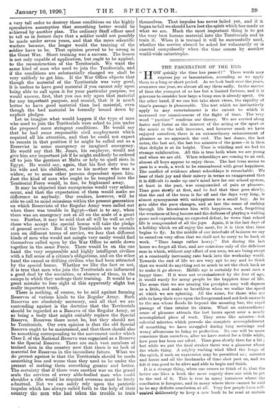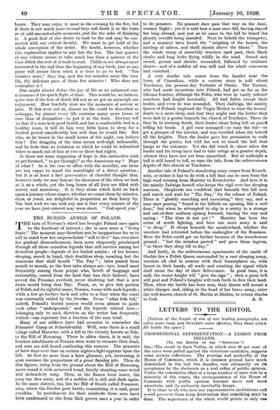THE FASCINATION OF THE END.
"HOW quickly the time has passed !" These words may express joy or lamentation, according as wo apply them to a long or short period. As we look back over the years, even over one year, we almost all say them sadly. lathe matter of time the youngest of us has but a limited fortune, and it is grievous to consider how large a lump sum is already spent. On the other hand, if we can but take short views, the rapidity of time's passage is pleasurable. The test which we instinctively apply to any entertainment is the extent to which it increased our consciousness of the flight of time. The very word " pastime " confirms our theory. We are carried along faster and faster as the interest of the acting or the sport or the music or the talk increases, and however much we have enjoyed ourselves, there is an extraordinary enhancement of pleasure as we approach the end. The last dance, the last notes, the last act, the last ten minutes of the game—it is then that delight is at its height. Time is whirling and we feel its strange exhilaration. All this is true both when we are young and when we are old. 'When schooldays are coming to an end, almost all boys appear to enjoy them. The last term seems to pass in a week, a week to be remembered with great happiness. The conflict of evidence about schooldays is remarkable. We hear of their joy and their misery in terms so exaggerated that it is difficult to ,make up one's mind how far our school system, at least in the past, was compounded of pain or pleasure. Time goes slowly at first, and to feel that time goes slowly, that the end of the term is far off and the days very long, is almost synonymous with unhappiness to a small boy. As he gets older the pace changes, and at last the sense of rushing through life intoxicates him with happiness, and, forgetting the weariness of long lessons and the dullness of playing a waiting game and experiencing an expected defeat, he -vows that school life is compounded of all the joys. Again, it is the last days of a holiday which we all enjoy the most, for it is then that time begins to fly. In the middle of our interlude of laziness we say to ourselves very often that we shall not be sorry to be back at work. "Time hangs rather heavy." But during the last hems we forget all that, and are conscious only of the delicious ease in which, without any effort of our own,we are being swept at a constantly increasing rate. back into the workaday world. Towards the end of life wo are very apt to say and to think that we would do anything not so much to set the clock back as to make it go slower. Middle age is certainly for most men a happy time. If it were not overshadowed by the fear of , age, it would surely for many people be the happiest time of life. The sense that we are nearing the precipice may well depress us a little, and make us breathless when we realize the speed at which we are spinning. All the same, for those who are able to keep their eyes upon the foreground and not look onwards to the sea .whose floods lie beyond the moaning bar, the rapid passage of time retains its charm. What an extraordinary sense of pleasure attends the last hours spent over a nearly accomplished piece of work. They seem like minutes—but celestial minutes, which precede the complete accomplishment of something we have struggled during long mornings and .weary afternoons to bring to perfection. No one will be more conscious than ourselves, after we have rested for a little while, how poor has been our effort. Time goes slowly then for a bit ; but while we put the final strokes there was a glamour about the whole thing. A mighty rushing 'wind filled the lungs of the spirit, if such an expression may be permitted us ; minutes and hours and all the landmarks of time shot past us, and we felt it was good to be alive and able to begin and finish.
It is a strange thing, when one comes to think of it, that the better one likes a book the more eagerly does one wish to get to the end of it. This is true in many instances where the conclusion is foregone, and in many where there cannot be said to be any definite conclusion at all. Very few people have self- control deliberately to keep a new book to be read at certain hours. They may enjoy it most in the evening by the fire, but U there is not much more to read they will finish it in the train or at odd uncomfortable moments, just for the sake of finishing it. A good deal of this desire to rush to the end may be con- nected with our critical faculty. We want to get hold of the whole conception of the artist. We doubt, however, whether this explanation applies to any but the few. The last quarter of any volume seems to take much less than a quarter of the time which the rest of it took to read. Children are always more interested in the end than the beginning of any book, just as any game will amuse them when it is time to go to bed. "Ten minutes more," they beg, and the ten minutes seem like two. Oh, the delicious pace of those few minutes ! Who does not remember it ?
One might almost define the joy of life as an enhanced con- sciousness of the quick flight of time. This would be, we believe, quite true if the fear of death did not as we get on outweigh our enjoyment. How fearfully slow are the moments of sorrow or pain. If this were not so, almost no life could be described RS unhappy, for almost every life contains many more hours of ease than of discomfort—to put it at the least. Doctors tell us that if a man is in good health and has a comfortable bed in a healthy room, it will do him very little harm to sleep for a limited period considerably less well than he would like. But who, as he tosses in the small hours of the night, can believe this ? The dragging of the time seems well-nigh unbearable, and he feels that no irritation to which he could be submitted takes so much out of him as two or three bad nights.
Is there not some suggestion of hope in this instinctive wish to get forward, "to get through;" as the Americans say ? Hope of what ? As is the case so often with the moralist, our ideas are too vague to stand the searchlight of a direct question ; but it is at least a fact provocative of cheerful thought that, however truly we may lament the shortness of life when we look at it as a whole, yet the long hours of all lives are filled with misery and monotony. It is they alone which hold us back upon a journey whose stages, whether we count them by minutes, days, or years, are delightful in proportion as they hurry by. The best wish we can wish any one is that every minute of the year we have just entered may seem short. "God speed you."



































 Previous page
Previous page